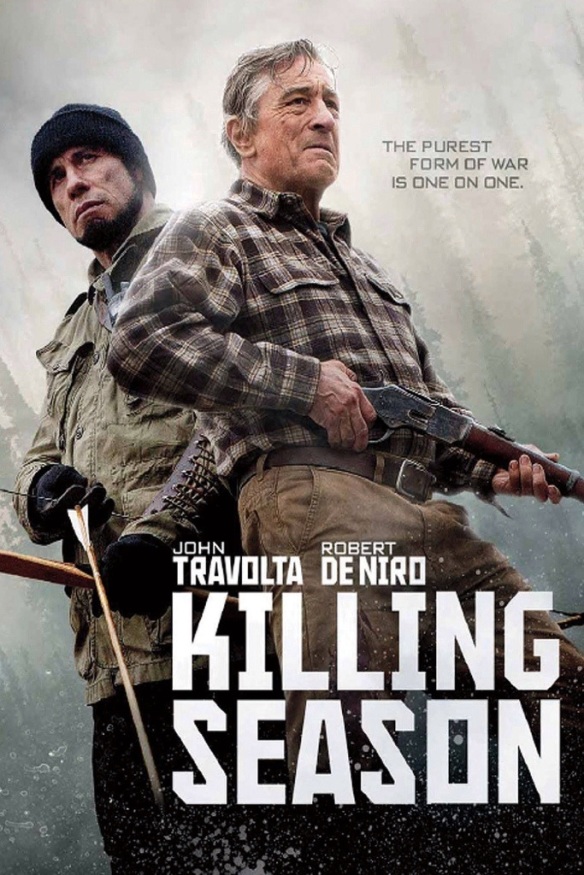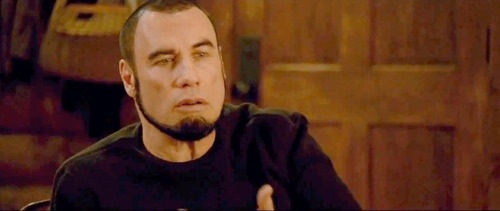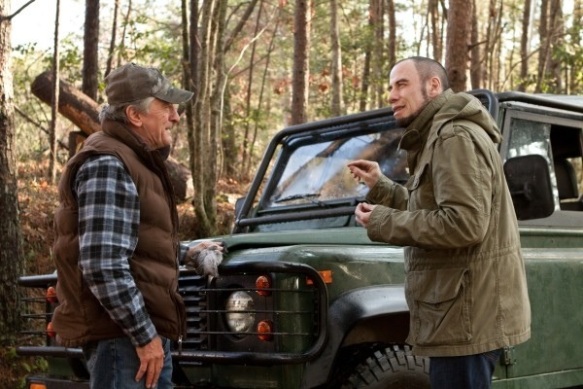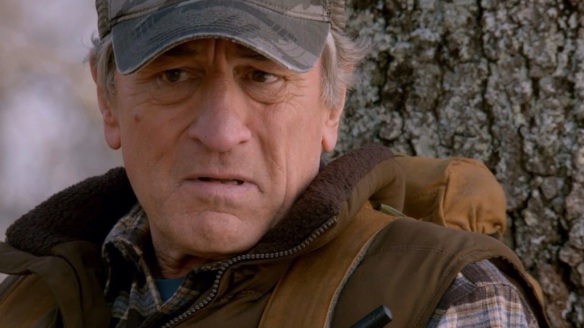Review by jjames Reviews
With an experienced director, two stars capable of carrying an action adventure and a terrific first scene, Killing Season promises to be a quality film. With a dulled color pallette that is tinted green, the opening immerses us in the horrors of Serbian genocide against Bosnian Muslims, and also in western soldiers’ intervention, an intervention that culminates in United States’ soldiers executing Serbian combatants. It is both horrifying and scintillating.
Then, Killing Season advances roughly twenty years, whereupon it shows us a Serbian, Emil Kovac (John Travolta), purchasing information on Nato forces. He is particularly interested in retired Colonel Benjamin Ford (Robert De Niro), to the point that he promises he’s now going hunting. Within these first few moments, Director Marc Steven Johnson sets the tone, leaving no doubt that both characters are somehow involved with the initial execution. It is a classic set up for a compelling mono-y-mono adventure story, wherein one character vies for revenge while the other fights for survival.
Eventually, that is exactly what happens, but not as quickly as the viewer expects, a fact that serves as the film’s first flaw. Johnson tarries, introducing Colonel Ford and wallowing in the man’s sadness, leaving the viewer to anxiously anticipate action. And then anticipate. And anticipate some more.
Finally, Ford and Kovac meet, a scene during which Johnson builds tension. But then he pauses it again, letting Kovac philosophize on remembering the past while Ford resists his questions. In these moments, we gain some insight into Kovac’s motivation, but we also understand that these characters are thinly defined. Meaning we continue to anticipate action.
That is when Writer Evan Daugherty makes the first of many mistakes. To this point, the Colonel is defined as a self-imposed hermit, one who shuns almost all human contact, whose sole motivation seems to be restocking his supply of Aspirin. But he still agrees to go hunting with a near-stranger about whom he knows almost nothing, thereby apparently foregoing his need for painkillers. It is a senseless and character-breaking decision.Yes, the action finally picks up once the men start hunting, but it is hard to escape the lingering sensation that they should not be together in the first place.
Killing Season’s screenplay does not get better from there. Emil Kovac is frustratingly one dimensional and Benjamin Ford is only marginally better developed. Moreover, Ford consistently makes decisions that violate characterization, leaving us to wonder whether or not the director and writer have any idea whom they want this man to be. Take for example the salted lemonade scene, which might be brilliant except that Ford behaves inexplicably; his actions violate everything Johnson and Daughterty tell us about his psychology and experience.
Not only are the characters poorly constructed, but so is the plot. It relies on WWE-style phsyical recoveries that are biologically improbable, if not impossible. It also requires too much happenstance and coincidene, especially when Ford’s family arrives at the most inopportune moment. And then it gets even more silly by using an open wound and shrapnel in laughably rediculous fashion.
As if it isn’t already clear, Killing Season is not well written or well-directed. But what about the performances? Only two of them matter, and John Travolta’s is uneven. On the one hand, the actor captures Kovac’s determination, not to mention his ambivalence toward his own survival, but, on the other hand, Travolta’s Serbian accent is not good, a fact that clouds the rest of his work.
Robert De Niro, however, is excellent, so excellent that it is reminiscent of some of his early performances. With subtle facial expressions and physical movements, De Niro communicates emotions the script doesn’t. He also has some tour de force moments throughout the film, such as the aforementioned lemonade scene, in which he makes Ford’s actions feel equally creepy and justified. De Niro is even better whenever the colonel is at his most vulnerable. Then the actor’s face shows weakness masked by a veneer of resolve with such crispness that we cannot help but empathize with the character. Robert De Niro is so good in Killing Season that John Travolta shouldn’t be sharing the screen with him.
De Niro isn’t the movie’s only merit. Johnson, the director, capitilizes on his natural setting, making fauna and vegetation beautiful or intimidating as the scene requires. Moreover, Killing Season’s ending is thematically satisfying, mostly because it bucks genre and delivers something somewhat unexpected.
Yet, the other merits are minor and would not make the film worth watching. Without Robert De Niro, Killing Season would be an unwatchable and sloppy mess. With him, it is still a mess, but at least it holds attention.









Excellent review my man. Thanks for getting involved. I will get around to this one just for DeNiro’s sake but I’m not holding out much hope and that beard from Travolta is terrible thing.
Travolta’s beard is bad. His accent is worse. But De Niro is so engaging that the movie at least remains watchable all the same.
And thanks for letting me get involved. It was fun!
I’m all most put off it entirely by the ridiculousness of Travolta’s bear but for Bobby’s sake, he deserves the attention.
Our pleasure having you bud. 🙂
Mate.
His beard is amazing, whats wrong with it? I’m thinking about doing mine the same way lol
And whats wrong with his accent?
It really was a very disappointing movie to me, so can understand that rating.
Definitely not a very good movie.
Did you like De Niro as much as I do?
I guess because I was so annoyed by the movie, that I actually did not pay too much attention to the performances….or it might have been Travolta’s crazy accent and his shoeshine beard that distracted me.
And for good reason. Travolta is very distracting here. 😉
Thanks again Tyson and Mark for letting me take part! It was fun. (Though a part does wish I’d gotten to ing earlier, when I could have seen a better movie.) 😉
I hear you, man. I’ve seen that many DeNiro movies that I ended up with Rocky & Bullwinkle. Let’s just say, it wasn’t much fun 😉
I actually read your Rocky & Bullwinkle review, while I was trying to decide how to format my Killing Season review.
I haven’t seen it, but I’ma make sure I keep it that way. 🙂
It would be a wise move to keep it that way. Quite possibly DeNiro worst film. I struggle to think of anything that’s been worse.
Wow, great work James! I’ve never even heard of this movie. How can a movie with both De Niro and Travolta fly so quietly under the radar?
Thank you very much!
I had heard of this movie, but had no intention of watching it until Mark asked me if I would. 🙂
Well, that’s all De Niro can do I guess, polish a turd!
This movie wasn’t that bad guys.
Like really? I’ve seen worse